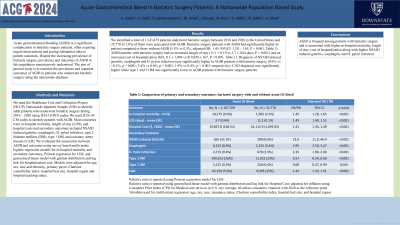Sunday Poster Session
Category: GI Bleeding
P0744 - Acute Gastrointestinal Bleed in Bariatric Surgery Patients: A Nationwide Population Based Study
Sunday, October 27, 2024
3:30 PM - 7:00 PM ET
Location: Exhibit Hall E

Has Audio

Anwar Uddin, MD
SUNY Downstate Medical Center
Brooklyn, NY
Presenting Author(s)
Anwar Uddin, MD1, Prashil Dave, MD2, Peter Lymberopoulos, MD1, Madia Ahad, MD1, Justin Chung, MD3, Narinderjeet Kaur, MD, MS1, Rafat Uddin, BA1, Rahat Uddin, MS1, Afgal Ahad, MD1
1SUNY Downstate Medical Center, Brooklyn, NY; 2State University of New York Downstate, Brooklyn, NY; 3SUNY Downstate Health Sciences University, Brooklyn, NY
Introduction: Acute gastrointestinal bleeding (AGIB) is a significant complication in bariatric surgery patients, often requiring urgent interventions and posing substantial risks to patient outcomes. Despite the increasing prevalence of bariatric surgery, prevalence and outcomes of AGIB in this population remain poorly understood. The aim of present study is to examine the prevalence and inpatient outcomes of AGIB in patients who underwent bariatric surgery using the nationwide database.
Methods: We used the Healthcare Cost and Utilization Project (HCUP) Nationwide Inpatient Sample (NIS) to identify adult patients who underwent bariatric surgery during 2016 – 2020 using ICD-10-PCS codes. We used ICD-10-CM codes to identify patients with AGIB. Main outcomes were in-hospital mortality, length of stay (LOS), and hospital costs and secondary outcomes included NSAID induced gastritis, esophagitis, H. pylori infection, type 2 diabetes mellitus (DM), type 1 DM, and coronary artery disease (CAD). We evaluated the association between AGIB and outcomes using survey based multivariate logistic regression models for in-hospital mortality and secondary outcomes, Poisson regression for LOS, and generalized linear model with gamma distribution and log link for hospitalization cost.
Results: We identified a total of 1,143,479 patients underwent bariatric surgey between 2016 and 2020 in the United States and 35,770 (3.13%) of them were associated with AGIB. Bariatric surgery patients with AGIB had significantly higher in-patient compared to those without AGIB (5.5% vs 0.5%, adjusted OR: 1.45, 95%CI: 1.28 – 1.65, P < 0.001, Table 1). AGIB patients with bariatric surgery had an increased length of stay (11.1 ± 0.19 vs 3.7 ± 0.04 days, P < 0.001) and an increased cost of hospitalization ($41,113 ± 1,094 vs $19,858 ± 167, P < 0.001, Table 1). Diagnosis of NSAID induced gastritis, esophagitis and H. pylori infection were significantly higher in AGIB patients with bariatric surgery (0.6% vs < 0.1%, p < 0.001; 3.4% vs 0.6%, p < 0.001; 1.9% vs 0.4%, p < 0.001; respectively). CAD diagnosis was significantly higher while type 1 and 2 DM was significantly lower in AGIB patients with bariatric surgery patients.
Discussion: AGIB is frequent among patients with bariatric surgery and is associated with higher in‐hospital mortality, length of stay, cost of hospitalization along with higher NSAID induced gastritis, esophagitis and H. pylori infection.
Note: The table for this abstract can be viewed in the ePoster Gallery section of the ACG 2024 ePoster Site or in The American Journal of Gastroenterology's abstract supplement issue, both of which will be available starting October 27, 2024.
Disclosures:
Anwar Uddin, MD1, Prashil Dave, MD2, Peter Lymberopoulos, MD1, Madia Ahad, MD1, Justin Chung, MD3, Narinderjeet Kaur, MD, MS1, Rafat Uddin, BA1, Rahat Uddin, MS1, Afgal Ahad, MD1. P0744 - Acute Gastrointestinal Bleed in Bariatric Surgery Patients: A Nationwide Population Based Study, ACG 2024 Annual Scientific Meeting Abstracts. Philadelphia, PA: American College of Gastroenterology.
1SUNY Downstate Medical Center, Brooklyn, NY; 2State University of New York Downstate, Brooklyn, NY; 3SUNY Downstate Health Sciences University, Brooklyn, NY
Introduction: Acute gastrointestinal bleeding (AGIB) is a significant complication in bariatric surgery patients, often requiring urgent interventions and posing substantial risks to patient outcomes. Despite the increasing prevalence of bariatric surgery, prevalence and outcomes of AGIB in this population remain poorly understood. The aim of present study is to examine the prevalence and inpatient outcomes of AGIB in patients who underwent bariatric surgery using the nationwide database.
Methods: We used the Healthcare Cost and Utilization Project (HCUP) Nationwide Inpatient Sample (NIS) to identify adult patients who underwent bariatric surgery during 2016 – 2020 using ICD-10-PCS codes. We used ICD-10-CM codes to identify patients with AGIB. Main outcomes were in-hospital mortality, length of stay (LOS), and hospital costs and secondary outcomes included NSAID induced gastritis, esophagitis, H. pylori infection, type 2 diabetes mellitus (DM), type 1 DM, and coronary artery disease (CAD). We evaluated the association between AGIB and outcomes using survey based multivariate logistic regression models for in-hospital mortality and secondary outcomes, Poisson regression for LOS, and generalized linear model with gamma distribution and log link for hospitalization cost.
Results: We identified a total of 1,143,479 patients underwent bariatric surgey between 2016 and 2020 in the United States and 35,770 (3.13%) of them were associated with AGIB. Bariatric surgery patients with AGIB had significantly higher in-patient compared to those without AGIB (5.5% vs 0.5%, adjusted OR: 1.45, 95%CI: 1.28 – 1.65, P < 0.001, Table 1). AGIB patients with bariatric surgery had an increased length of stay (11.1 ± 0.19 vs 3.7 ± 0.04 days, P < 0.001) and an increased cost of hospitalization ($41,113 ± 1,094 vs $19,858 ± 167, P < 0.001, Table 1). Diagnosis of NSAID induced gastritis, esophagitis and H. pylori infection were significantly higher in AGIB patients with bariatric surgery (0.6% vs < 0.1%, p < 0.001; 3.4% vs 0.6%, p < 0.001; 1.9% vs 0.4%, p < 0.001; respectively). CAD diagnosis was significantly higher while type 1 and 2 DM was significantly lower in AGIB patients with bariatric surgery patients.
Discussion: AGIB is frequent among patients with bariatric surgery and is associated with higher in‐hospital mortality, length of stay, cost of hospitalization along with higher NSAID induced gastritis, esophagitis and H. pylori infection.
Note: The table for this abstract can be viewed in the ePoster Gallery section of the ACG 2024 ePoster Site or in The American Journal of Gastroenterology's abstract supplement issue, both of which will be available starting October 27, 2024.
Disclosures:
Anwar Uddin indicated no relevant financial relationships.
Prashil Dave indicated no relevant financial relationships.
Peter Lymberopoulos indicated no relevant financial relationships.
Madia Ahad indicated no relevant financial relationships.
Justin Chung indicated no relevant financial relationships.
Narinderjeet Kaur indicated no relevant financial relationships.
Rafat Uddin indicated no relevant financial relationships.
Rahat Uddin indicated no relevant financial relationships.
Afgal Ahad indicated no relevant financial relationships.
Anwar Uddin, MD1, Prashil Dave, MD2, Peter Lymberopoulos, MD1, Madia Ahad, MD1, Justin Chung, MD3, Narinderjeet Kaur, MD, MS1, Rafat Uddin, BA1, Rahat Uddin, MS1, Afgal Ahad, MD1. P0744 - Acute Gastrointestinal Bleed in Bariatric Surgery Patients: A Nationwide Population Based Study, ACG 2024 Annual Scientific Meeting Abstracts. Philadelphia, PA: American College of Gastroenterology.
